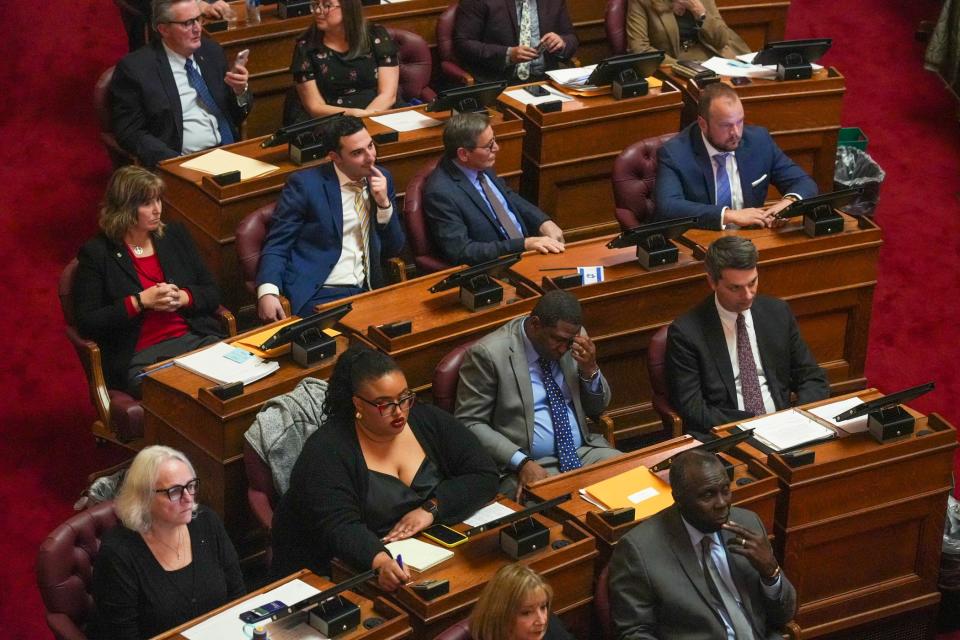Everyone wants something from Rhode Island's part-time lawmakers. Here's the list.
One month into the legislative session, fundraising season is in full swing.
The number of newly filed bills is growing by the day – 749 at last count.
"Bridgegate" is sucking up oxygen – and driving time.
But the long nights of marathon hearings have not yet started. Instead, each session day begins with a parade of groups giving State House news conferences trumpeting their wish lists.
And they all want something from Rhode Island's $19,000-a-year, part-time legislators.
What do they want?
We asked leaders from high-profile and influential interest groups – including the Rhode Island AFL-CIO, the Greater Providence Chamber of Commerce, the Economic Progress Institute, the Rhode Island Medical Society, the Hospital Association of Rhode Island, gun advocates, housing advocates and others: What tops your agenda?
Some of their answers sound Groundhog Day-familiar (though no less important to their backers): Ban "assault weapons." Reform payday lending. Slap a new income-tax surcharge on the wealthy.
On Tuesday, one of the state's big teacher unions – the National Education Association Rhode Island – is having a news conference to tout its three main priorities. The top item? Changes to Raimondo-era "pension reforms" to provide some relief to retirees and current teachers.
The problems? "Active members working longer for less. Educators choosing to drive 20 minutes into another state for better wages and pensions," says NEARI spokeswoman Stephanie Mandeville.
On Thursday comes a coalition of open-government groups known as AccessRI with its own news conference to highlight more than 50 proposed improvements to Rhode Island's flawed (and much-abused) Access to Public Records Act.

Among them: "Making it less expensive for the public to access records, and making it harder for the government to withhold them."
"It targets specific instances when the government has used APRA to stonewall specific requests, like RIDOT's decision to withhold accident data it collects from all of Rhode Island's municipalities," says John Marion, executive director of Common Cause Rhode Island.
More: A Providence organization wanted crash data to make streets safer. RIDOT said it's private
"With respect to the Washington Bridge emails," he said of emails for which different media outlets were charged anything from zero to $450 for the same 236 pages, "the bill would lower the costs by doubling the amount of free search time given for each request, and providing two hours of free time for redaction."
It would also allow someone seeking records to request "a public interest waiver" from the government agency that possesses the records without having to go to court (as current law requires) to get records of enormous public importance for free.
"Given that this was the biggest news story in the state," Marion said of the highway bridge closure, "requiring advance payment from multiple legacy news organizations before release of the documents was a case of RIDOT using APRA as a shield in a way that undermines the purpose of the APRA."
At their own press conference last week, close to two dozen House Democrats drew attention to their own wish list: Put more money into public transportation, as much as $100 million. Build "public housing" to "help close the affordable housing gap." Provide free breakfasts and lunches at school for every child, regardless of family income.
How would they pay for it? A 3% surtax on millionaires' income. (The chances R.I lawmakers will raise taxes this year? Not great.)
More likely than a tax increase?
There's been an urgent – but quieter – push to raise the Medicaid reimbursements the state pays a wide array of professionals, giving doctors more of an incentive to come to Rhode Island and stay here.
With an "alarming" shortage of primary-care doctors, hospitals not paying their bills and Medicaid already eating up 30.45% of the state budget, House Speaker K. Joseph Shekarchi has already declared health care "a primary focus of the upcoming session."
Getting down to some specifics last week, Senate President Dominick Ruggerio called the $135 million in Medicaid rate hikes that Gov. Dan McKee has proposed for select groups – such as home health, behavioral health and early-intervention providers – "a good first step."
But he told The Journal that Rhode Island needs to 1) create "a process to more comprehensively examine our rate structures across the full continuum of care," 2) move hospital oversight into its own standalone agency and 3) consider tuition assistance "to help attract and retain health care professionals."
What does the Rhode Island Medical Society want?
The Medical Society's Stacy Paterno sounds the same theme: "Every Rhode Islander needs access to high quality primary care. This problem has been a long time coming and the fix will not occur overnight."
Paterno cited an idea to pay for "medical school, physician assistant or nurse practitioner school" for a limited number of Rhode Island residents. In exchange, they would pledge to practice in Rhode Island for several years.
More immediately, Paterno said their hope would be to provide "tuition reimbursement for those approaching graduation soon or already practicing medicine in Rhode Island through the state’s loan repayment program."
More: 'How did this happen?' Primary care shortage keeps hitting RI hard
For the state to attract and retain health care professionals, Paterno said, Medicaid reimbursements "must be improved."
"The very low reimbursement rates in Rhode Island from the Medicaid program [have] greatly contributed to our problems," she said.
And finally, Paterno said, they are working with legislators and administrators to allow "reasonable cross-border care" for residents who are out of state for part of the year, or residents who need to access physicians out of state.
"The suspension of some of the COVID-related rules related to telemedicine have left many of these individuals without adequate access to their care teams," she said.
What do the hospitals want?
Up to a point, the Hospital Association of Rhode Island wants the same thing: "Reimbursement policies that empower hospitals to attract and retain high-quality health care workforce talent in Rhode Island."
They also want "professional liability reform," a perennial issue that has been framed this year as one of several urgent steps needed to address the "unprecedented financial challenges" and "historic staffing shortages" facing the state's hospitals.
This year's bill [H7093] states the problem this way:
"In the midst of the many challenges limiting health care staffing and retention in R.I. ... professional liability exposure is ... [increasingly] eroding the interest of health care professionals to practice their professions in R.I. and threatening the financial stability of Rhode Island hospitals."
House Judiciary Chairman Robert Craven's latest bill would create a 15-member commission that includes representatives of the hospitals and the defense bar to study and then recommend changes "to curtail the negative impact of significant professional liability risk on the medical workforce and continued access to health care in this state."
What does the Economic Progress Institute want?
No surprise, the list of legislative priorities that Economic Progress Institute Executive Director Weayonnoh Nelson-Davies and Communications Director Andrew Grande sent along is long.
It stretches from repealing the law allowing "payday lenders" to charge annualized percentage rates of up to 260% to a proposed tax hike for the rich.
For the record, the House voted 70-2 last year to repeal the exemption allowing payday lending, based on this argument: "Payday lenders are taking millions of dollars out of our state while trapping Rhode Islanders in a cycle of debt." The late-moving bill died in the Senate. It's back this year.
More: Quick cash, high price: RI lawmakers again seek to rein in 'payday lending'
On the tax front, the group has also resurrected, in the name of "tax fairness," a familiar push for a 3% surcharge on the income of those in Rhode Island's "top 1%."
Other items overlap the priorities of other advocacy groups at the State House, including the Working Families Party and the Rhode Island AFL-CIO.
For example, the institute wants to expand the state's paid leave program for workers who stay home to care for a family member, including a new child, from six to 12 weeks; stretch the definition of family to include siblings, grandchildren and "chosen family," and "increase the wage replacement rate from 60% to 90% so that low-wage workers won't have to take a 40% pay cut to care for seriously ill family."
Other priorities:
Increase Rhode Island's minimum wage.
Tie annual cash assistance increases for Rhode Island's lowest-income families to inflation.
Expand eligibility for subsidized child care and boost the payment rates.
The Greater Providence Chamber of Commerce
As usual, president Laurie White's legislative to-do list begins with a vow to "forcefully" oppose any hikes in business fees and increases to corporate or personal income taxes.
White said the chamber would also "monitor and oppose" employment mandates that would "make Rhode Island an outlier relative to other states’ labor and employment laws or create state law that is redundant with federal law."
The chamber will closely watch new regulations in areas such as data privacy to make sure they are "clear and targeted to minimize confusion and costs as well as the potential for unanticipated consequences."
What will the chamber support? "Legislation which would preempt municipal workplace mandates."
The chamber is also urging more money for education, specifically for multi-language learners and high-cost special education, White said.
What does Reclaim RI want?
A "Tenants' Bill of Rights" tops the agenda of the advocacy group Reclaim RI.
The problem? "Amid a historic housing crisis, Rhode Island tenants lack safe and affordable rental options and are deprived of basic legal protections," said Shana Crandell, a tenant organizer with Reclaim RI.
"We urgently need cities like Providence to enact rent control, and for public housing authorities to build a new generation of state-financed mixed-income public housing," said Crandell.

Crandell said the legislature must take action to "protect Rhode Island tenants' right to stay in their homes," and allow tenants to organize or join a tenants' union without retaliation from their landlord.
"No tenant should ever have to face eviction proceedings without legal representation," said Crandell. "No tenant should ever be evicted from their home without good cause."
What does the AFL-CIO want?
Among the top items on organized labor's priority list:
A close look at "the unintended consequences" of the 2011 pension overhaul championed by then-General Treasurer Gina Raimondo, with a focus on "improving the state’s ability to attract and retain workers."
Enacting a bill to expand the State’s Temporary Caregivers Program, similar to what the Economic Progress Institute is seeking. A version passed the Senate last year but not the House.
Getting domestic workers covered by the state's minimum wage law. A bill to do this passed the House last year but not the Senate. Domestic workers are covered under the federal minimum wage law. This would apply the state’s higher wage to these workers.
Introducing legislation that establishes networked geothermal energy as a regulated utility. This will be the primary focus of the AFL-CIO's affiliated Climate Jobs Rhode Island coalition. In English, this means connecting nearby homes and businesses together to form a system or network of heat pumps," according to an industry publication.
Repealing a law restricting the naming of an insurance carrier in a collective bargaining agreement.
This article originally appeared on The Providence Journal: RI advocacy groups line up to make their pitches to lawmakers

